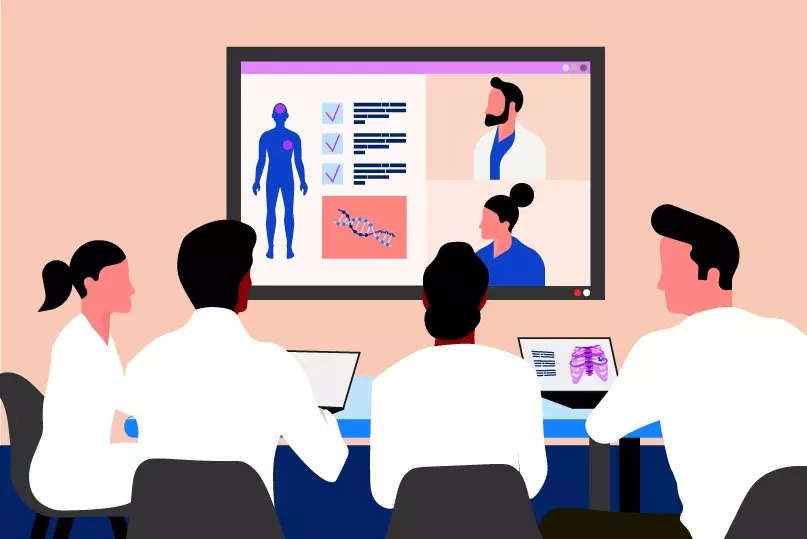
In recent years, the corporate healthcare landscape has undergone a dramatic digital transformation. Far beyond mere digitisation, we’re witnessing a profound reimagining of employee health management, driven by cutting-edge technologies and a growing recognition of health as a critical business asset. This technological revolution is not solely digitising existing processes but fundamentally altering the way health services are delivered, accessed, and managed in the workplace. The impact of these innovations on corporate health management is far-reaching- promising improved health outcomes, increased efficiency, and potentially significant cost savings.The Corporate Perspective on Online Healthcare Services
The pandemic fundamentally altered corporate attitudes towards online healthcare services. Pre-COVID, the adoption of digital health solutions was gradual, with many organisations hesitant to fully transition from traditional models of healthcare. However, the need for remote healthcare during the pandemic led to a rapid shift in this perspective.
Companies quickly recognised the benefits of digital platforms that allowed employees to access healthcare services without leaving their homes. Easy access to medical history allows informed decision-making and personalised care. The reduction in paperwork and administrative burden frees up resources and improves overall efficiency. Moreover, digital health solutions often prove more cost-effective in the long run, offering a strong return on investment for forward-thinking organisations.
Accessing traditional mental health services has long been challenging due to barriers like long waiting lists, poor availability, complicated referral processes, and social stigma. Unlike physical health, mental health hasn’t been prioritised, while people are advised to regularly undergo physical screenings, they are seldom encouraged to seek therapy or practice mindfulness.
The pandemic highlighted the critical need for mental health support, and employees are increasingly demanding that employers give more attention to mental and emotional wellness. Digital options have made accessing mental health care easier and more accepted, with virtual therapy sessions becoming a commonplace. According to the American Psychological Association‘s 2022 Work and Well-being Survey, 81% of workers would consider employer support for mental health when seeking future job opportunities, underscoring the importance of these services in the modern workplace.
Tech Innovations Transforming Corporate Healthcare
Telemedicine and virtual consultations have become cornerstone technologies in corporate health management, especially post pandemic. These tools enable remote health monitoring and provide employees with 24/7 access to medical professionals, reducing absenteeism and improving overall health outcomes. Artificial Intelligence (AI) and Machine Learning are driving predictive analytics for health risks, allowing companies to proactively address potential issues before they escalate. These technologies also enable the creation of personalised wellness programs tailored to individual employee needs and preferences.
Blockchain technology is revolutionising secure health data management. By ensuring the integrity and privacy of sensitive medical information, blockchain facilitates real-time health tracking and encourages greater employee engagement in wellness initiatives. This transparency and security builds trust in corporate health programs, leading to higher participation rates and better overall results.
Digital Solutions for the Insurance Sector
The insurance industry, a key player in corporate healthcare, is also benefiting from technological advancements. Automated claims processing significantly reduces turnaround times and minimises errors. AI-powered risk assessment models enable more accurate premium calculations, ensuring fair pricing for both companies and employees. Additionally, advanced analytics and machine learning algorithms are enhancing fraud detection and prevention capabilities, safeguarding the integrity of health insurance programs.
Revolutionising Cashless Health through Technology
Digital health wallets and integrated payment systems are streamlining the financial aspects of corporate healthcare. These technologies enable seamless, cashless transactions for medical services, reducing friction in the healthcare experience. Real-time benefit verification and authorisation systems ensure that employees can access care quickly and efficiently, without the stress of uncertain coverage or unexpected out-of-pocket expenses.
Measuring Effectiveness and ROI of Health and Wellness Programs
Measuring the effectiveness and ROI of health and wellness programs has become a critical focus for organisations. However, many employers lack the tools and expertise needed to analyse the vast amounts of data generated by these programs. This gap often leaves companies blind to the actual impact of their initiatives, hindering improvements and the ability to demonstrate ROI. Companies are increasingly turning to advanced analytics and digital tools to accurately measure the outcomes of their health programs.
By equipping themselves with the right tools and expertise, companies can ensure that their health and wellness programs are not just well-intentioned but also effective and impactful. This approach also reinforces the message that employees’ health and well-being are truly valued, further enhancing workplace morale and productivity.
Challenges and Considerations
While the benefits of digital integration in corporate healthcare are substantial, several challenges must be addressed. Data privacy concerns remain at the forefront, requiring robust security measures and transparent policies. Technology adoption and training can be hurdles, particularly for older employees or those in non-tech-savvy roles. Ensuring inclusivity and accessibility is crucial to prevent digital health solutions from inadvertently creating healthcare disparities within the workforce.
Future Outlook
As digital health technology advances, employers have more opportunities to enhance virtual care options, delivering improved care at reduced costs while boosting employee engagement. By integrating a diverse range of virtual care services into healthcare benefits, companies can ensure that employees’ health needs are met effectively, minimising the risk of neglect or improper management. This strategy also expands access to care and medical expertise at any time and place, leading to increased employee productivity, satisfaction, and engagement.
In conclusion, the digital integration of corporate healthcare represents a paradigm shift in employee health management. By embracing telemedicine, AI, blockchain, and other innovative technologies, companies can offer more comprehensive, efficient, and personalised healthcare services to their employees. While challenges remain, the potential benefits in terms of improved health outcomes, cost savings, and employee satisfaction are immense. As technology continues to advance, the future of corporate healthcare promises to be increasingly connected, data-driven, and employee-centric.


